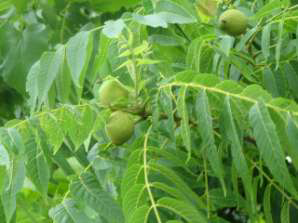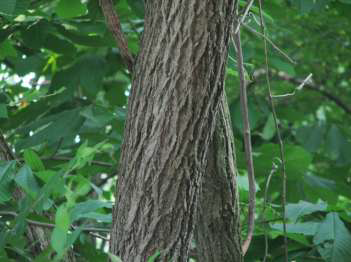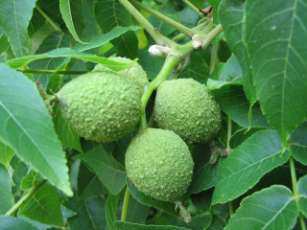 Black Walnut
Black Walnut
(Juglans nigra L.)
|
Classification |
| Kingdom: |
Plantae |
| Division: |
Magnoliophyta |
| Class: |
Magnoliopsida |
| Order: |
Fagales |
| Family: |
Juglandaceae |
| Genus: |
Juglans |
| Species: |
J. nigra |
 Characteristics: The Black Walnut is a deciduous tree reaching heights of 100 to 130 feet tall. The bark is grey-black and deeply furrowed. The leaves are alternate and odd-pinnately compound with 15–23 leaflets. The flowers are small and greenish, appearing in the early spring with male and female flowers on separate stalks. In the autumn they mature into a fruit with a brownish-green, semifleshy husk and a brown corrugated nut. The whole fruit, including the husk, falls in October; the seed is relatively small and very hard.
Characteristics: The Black Walnut is a deciduous tree reaching heights of 100 to 130 feet tall. The bark is grey-black and deeply furrowed. The leaves are alternate and odd-pinnately compound with 15–23 leaflets. The flowers are small and greenish, appearing in the early spring with male and female flowers on separate stalks. In the autumn they mature into a fruit with a brownish-green, semifleshy husk and a brown corrugated nut. The whole fruit, including the husk, falls in October; the seed is relatively small and very hard.
Habitat: The Black Walnut grows well in moist welldrained soils, especially along streams and scattered in mixed forests. It is a light-demanding species.
Range: The Black Walnut is native to the eastern half of the United States, from New York to Florida and central Texas to southeastern South Dakota.
Native American Uses: Common Native American uses of the Black Walnut include utilizing infusions to treat goiter, smallpox, ringworm, and toothaches. Tea made from the bark was used to treat gastrointestinal ailments; however a strong decoction of the bark was taken as a cathartic and an emetic. The dried nuts were valued as a food item. Groups that utilized this plant include the Cherokee and the Delaware Indians. Colonial Uses: The colonists used the strong hardwood of the Black Walnut for gunstocks, furniture, flooring, paddles, coffins, and a variety of other woodworking products. They also made a blackish dye from the husks of the fruit. In addition, colonists consumed dried nuts from the tree, which were prized for their flavor. The Black Walnut was introduced into Europe in 1637. It was cultivated there as a forest tree for its high quality wood.
Modern Uses: Black Walnut continues to be used for flooring, cabinetry, and other furniture items.